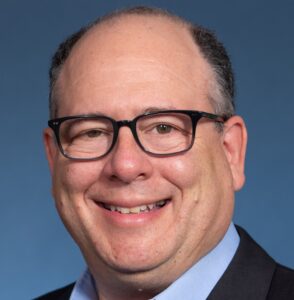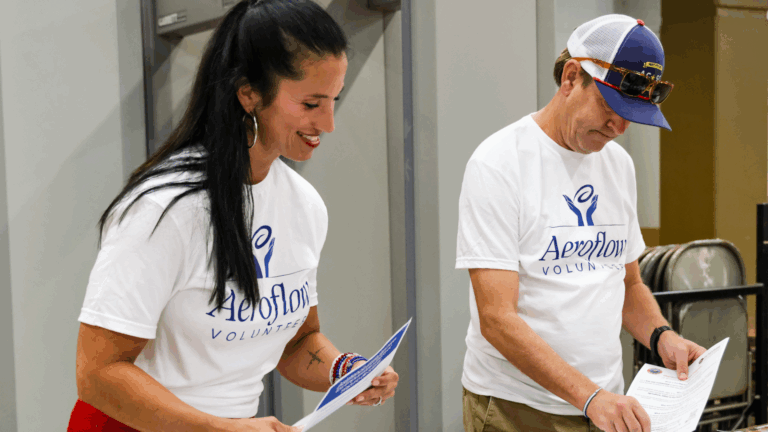This content has been reviewed for accuracy by Mike Cantor, Chief Medical Advisor at Aeroflow Health.
Dive into our blog inspired by our webinar, “Data Driven Strategies: Harnessing The Unanticipated Power of Partnerships In Value-Based Care,” to discover the opportunities Aeroflow Health brings to health plan value-based care initiatives. From tailored strategic alignment and seamless data integration to quality measures, innovative solutions, and cost-effective strategies, we’re dedicated to exceeding expectations. For a deeper understanding and comprehensive insights, don’t miss the chance to watch the webinar playback.
Table of Contents
How can health plans effectively collaborate with their provider community, including DME providers, to ensure a seamless and coordinated approach to delivering value-based care?
Amanda: Immediately, I think of the phrase “building a care team,” and I think it’s essential to recognize that there are multiple providers that play a part in a patient’s care journey. In our experience, as a DME, we’ve seen patient journey mapping to be very helpful in the collaboration process. Understanding who the patient is engaging with and when they are doing so, helps us to pinpoint patient journeys that have gone well that we would want to try and duplicate and also those who haven’t had a positive journey, so that we can understand where gaps in care might be present. I believe many solutions are in place that ensure a seamless and coordinated care approach, and when health plans look at unlikely providers like DME, there are more significant resources that can be tapped into.
Ryan: Opening up lines of communication with health plans and DME suppliers is crucial. When health plans understand the touch points that we have with the patients as the medical equipment supplier, and vice versa, when we as the DME understand the journey from a health plan perspective, the patient is able to receive a holistic continuum of care. One way in particular that Aeroflow Health approaches this topic is by providing integrated solutions where and when the patient wants to be met. We also have seen this come into play regarding “notification of pregnancy.” In many cases, we are able to partner early with these moms in their maternal journey and provide resources like breast pumps and education. For example, I know that through our partnership with Sentara Health, we’ve been able to impact many mothers.
Could you share examples or success stories where health plans have successfully integrated DME providers into their value-based care initiatives, resulting in improved patient outcomes?
Kate: Sentara has had a very successful partnership with Aeroflow, specifically with our Mom & Baby program. One of the many advantages has been receiving member- level data, which has allowed us to reach out in a more timely manner and actively engage our members where they are. Receiving ongoing data like “notification of pregnancy” has been huge for us. This has helped us know when to reach out to members and engage them with our programs regarding breastfeeding and other additional educational resources. Aeroflow and Sentara’s goals align, and this has allowed us to utilize and leverage the information we receive. We want positive patient experiences for all of our members, so when we hear that our partnership with Aeroflow is closing gaps in care like breast pump utilization and education on breastfeeding that leads to moms being able to breastfeed in their desired timeframe, we’re thrilled. Being able to partner with Aeroflow in a member’s journey from conception to post-partum has allowed Sentara to offer programs of longevity.
Amanda: To piggyback off Kate, Aeroflow has been able to do more than just provide a data feed; we’re able to extend trust by notifying patients that they are going to be receiving outreach from their health plan partner. This warm handoff encourages and facilitates better engagement and provides a sense of empowerment for patients. The secondary piece is collaboration. Early on, we discussed with Sentara the pieces of communication that they wanted their members to be aware of, and Aeroflow was able to provide that wraparound service for them.
How can health plans leverage data and analytics to gain insights into the patient journey and identify opportunities for collaboration with DME providers to enhance the overall quality of care?
Amanda: I think notifications of pregnancy are just the start. When we map out the patient journey, the points of follow-up are made clear, and health plans and DMEs are able to see the gaps in care where we as a team can collaborate to intervene. Health literacy, in particular, is a huge opportunity for collaboration. Most people don’t understand insurance at a fundamental level, and Aeroflow has really been able to step in the gap to help educate patients and provide resources that make the often stressful circumstances less uncomfortable.
Lauren: Not only has Aeroflow Health been dedicated to providing patients with the supplies they need, like breast pumps and CPAP devices, but we’ve also been a partner in education through transparency that has built trust. We do the heavy lifting for patients as far as working with their insurance plan provider and determining the services and supplies that they are eligible for through their insurance. We’re able to lay out in a clear, concise manner what benefits are available and then provide any counseling or education they need along the way in their choices. We’ve also been able to learn what modality of communication is best for patients which we are able to relay to health plans to assist in their engagement strategies. We help health plans meet their members where and how they would prefer.
What do health plans have to gain by partnering with DME providers?
Amanda: DME vendors are definitely the unexpected partner. This is unfortunate as DME’s are one of the most engaged partners in care for patients. There is a great opportunity for health plans to build bridges of trust between the patient, health plan and medical equipment provider.
Ryan: Trust in healthcare is very important when it comes to the continuum of care for patients. When health plans choose to collaborate and open lines of communication with the DME provider, the DME provider can help drive the health plans’ overarching engagement goals. DME providers often have valuable data such as social determinants of health, mental health assessments and more.
What are some challenges or barriers that health plans face when trying to align with the provider community, including the DME providers? What is being done to address these challenges?
Amanda: A couple of barriers come to mind. Often, we put so much emphasis on the financial model of value-based care models and so you’ll see like capitation or sole sourcing, which is of course the goal that we’re all marching after. We all want to have some financial gain and achievement that generates a lower cost to the patient and satisfies the providers and health plan partners, but where I believe we potentially hit some failures is when this becomes the key driver. When we don’t ask questions like, “what is the patient actually doing and how is the patient actually navigating through this?” it becomes a more substantial burden on our health plan partners. I think if we can look at who’s already in the markets, get an assessment of how they’re actually performing in those markets, what the perception by the provider, health plan and patient communities is and how they are all engaging together, I think that’ll give us a good indicator of who we should be pursuing a value-based partnership with. We spend a lot of time looking into complaints and overall satisfaction levels instead of looking deeper into data like Net Promoter Scores and other reports of patient satisfaction. I also think there has to be some sort of reward mechanism that incentivizes a positive experience. It takes a team being aligned on goals to achieve well-rounded care.
Kate: I think some of the obvious challenges and barriers include communication, collaboration and goal alignment. As a health plan, we want to see increased patient engagement and member experience but we also want more positive health outcomes.
A part of this is increasing access for the members to get what they need and that’s where a DME plays a crucial part. If a patient doesn’t have access to the products and supplies they need, they are unable to meet their care goals. Years ago, when Sentara was researching providers that could supply products and coinciding programs that had a wraparound care approach, we found Aeroflow. This really led to our decision of partnership.
Lauren: Over the course of healthcare history, it’s not been common for patients to have a lot of choice as it relates to healthcare. Aeroflow understands this sore spot and has built out experiences for patients where they can feel in control of their health journey. For example, for those who choose to breastfeed, selecting a breast pump is an incredibly personal decision, and we understand the value of giving moms the choice of which breast pump suits their individual needs. Another piece of this is the additional piece of being able to provide lactation support and education via telehealth. Aeroflow is able to bridge the gap here. The convenience of utilizing these services leads to more moms needing the education they need to start breastfeeding or to continue even when difficulties arise.
Can you provide insights into the role of technology in facilitating communication and collaboration between health plans and their provider community, especially DME providers, to deliver more patient-centric and value-based care?
Lauren: Technology has made our processes more efficient for both our patients and customer service teams. It has also allowed us the time and flexibility to provide more of a white-glove solution for our patients that aren’t as comfortable with technology. We’ve been able to put more intentional time and care towards that more at-risk patient base and make sure they aren’t lost in the process.

Michael Cantor, M.D.
Dr. Mike Cantor is a geriatrician and attorney who has extensive experience designing and implementing value-based care, quality improvement, and care management programs for healthcare providers and health plans. He works as a fractional (part-time) Chief Medical Advisor for Aeroflow Healthcare, Uber Health, and other technology-enabled health services companies, value-based care organizations and digital health companies. Previous roles include: CMO for Bright Health Plan, an innovative health
insurer; CMO for CareCentrix, a leading outsourced home health, durable medical equipment, and post- acute care benefits manager recently acquired by Walgreens; and CMO for the New England Quality Care Alliance (NEQCA), the physician network affiliated with Tufts Medical Center, where he implemented network-wide quality improvement and care management programs for 150,000 managed care lives. He trained in internal medicine at Beth Israel Hospital in Boston and did his geriatrics fellowship at Harvard Medical School. He has degrees in law and medicine from the University of Illinois.

Ryan Bullock
Ryan serves as Chief Strategy Officer at Aeroflow Health, a premier nationwide provider of durable medical equipment. In his current position, Ryan oversees strategic operations, corporate development and government relations. For over 14 years, Ryan has provided exceptional leadership, management and vision to Aeroflow, resulting in incredible growth and profitability for the company. Ryan holds a Bachelors of Science degree in Electronic Engineering from Western Carolina University and resides with his family in the beautiful mountains of Asheville, North Carolina.

Amanda Minimi
Amanda is the Director of Corporate Development at Aeroflow Healthcare, the largest provider of breastfeeding equipment and services in the nation. Amanda has led Aeroflow Healthcare's health plan partnership initiatives where there collaboration-based solutions have led to better outcomes through high patient engagement and increased instances and duration of breastfeeding. Amanda also serves as the co-chair of AAHomeCare's Breastfeeding Coalition, a team that works with states and health plans to advocate to reduce barriers in access to breastfeeding.

Kate Maas
Kate Maas has focused her nearly 20-year career specializing in Medicaid populations. She is the Manager of Marketing, Development and Outreach at Sentara Health Plans–Virginia’s largest Medicaid plan. She has held health plan and managed care leadership roles for the past 12 years. With a Master of Public Health (MPH) from the joint Eastern Virginia Medical School and Old Dominion University program, Kate is an expert in maternal and child health, as well as program development for member and community engagement.

Lauren Bennett
Lauren Bennett is Chief Operating Officer for Aeroflow Health, where she leads national operational performance and experience. Lauren joined Aeroflow Health in 2014 and has held a variety of leadership roles within the company in strategy, experience, innovation, data analytics and growth. In her current role, Lauren oversees more than 200 operations employees and leaders across multiple business areas at Aeroflow Health. Lauren's priority is improving the experience for patients, health plans, providers and employees. Previously, Lauren was Vice President of Aeroflow Sleep and Director of Sales Operations for Aeroflow Breastpumps. She is known for driving innovation and efficiency through implementing state of the art automation with a goal of delivering a seamless patient experience




